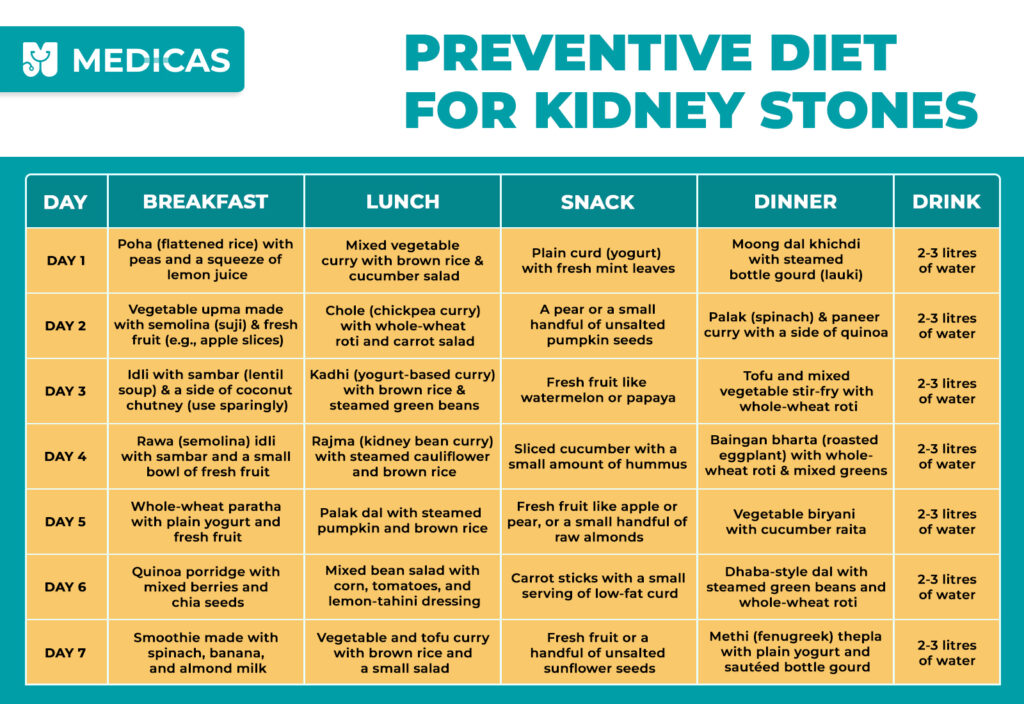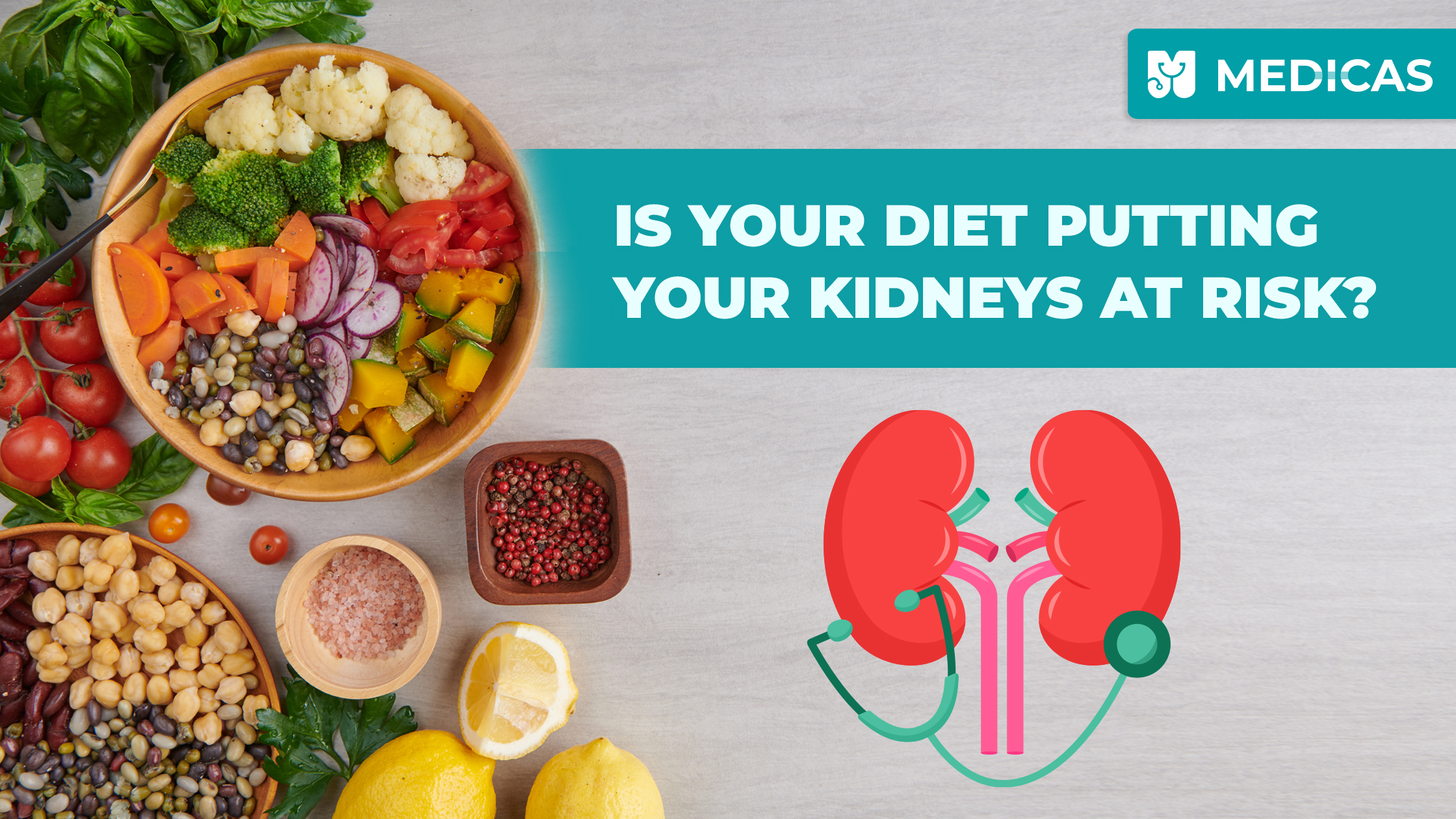Quick Links
Introduction
You’ve likely heard the horror stories about kidney stones – the excruciating pain, the emergency room visits and the days spent doubled over. If you haven’t personally endured the agony of kidney stones, consider yourself fortunate. These crystalline intruders affect millions worldwide. In fact, according to statistics released by the National Kidney Foundation, kidney stones can affect anywhere between 1-11% of the world’s population.
And in medical terms, that’s quite significant, making it a silent but formidable health threat. “About 10% of the world population has kidney stones. If you put that in perspective of India which has 1.4 billion people, it would be about 140 million people will get kidney stones,” said Dr Kumar Sujeet, Nephrologist from Wisconsin, USA during his interaction with Medicas.
While genetics and medical conditions can increase your risk of kidney stones, your dietary choices are your strongest defence. Unlike other risk factors, following a diet to prevent kidney stones is entirely within your control and plays a significant role in helping you build a strong fortress against kidney stones. Understanding the intricate link between nutrition and kidney health can significantly lower your risk of experiencing the debilitating pain associated with kidney stones.
This blog will uncover the dietary secrets to protecting your kidneys. We’ll provide a detailed 7-day kidney stone diet chart, explore which foods to embrace and avoid, and offer practical tips for incorporating kidney-friendly habits into your lifestyle.
But first, let’s start with the basics.
Understanding Kidney Stones
Kidney stones, medically termed renal calculi or nephrolithiasis, are formed when certain substances in urine such as calcium, oxalate, and uric acid become concentrated enough to crystallise. These crystals can clump together to form stones, which may vary in size and shape. While small stones may pass through the urinary tract unnoticed, larger stones can cause intense pain as they travel through the urinary tract or even cause blockages or kidney damage along the way.
Types of Kidney Stones
Kidney stones can be classified into several distinct types, each with its unique characteristics and contributing factors. Here’s how they are divided:
Calcium Oxalate Stones: The most prevalent type of kidney stone, calcium oxalate stones, are primarily composed of calcium oxalate. These stones can be influenced by a variety of factors, including hyperparathyroidism, renal calcium leak, and other underlying conditions.
Struvite Stones: Often associated with urinary tract infections (UTIs), struvite stones are composed of a combination of magnesium, ammonium, phosphate, and calcium carbonate. These stones can grow significantly, sometimes taking on the shape of a stag’s horns, a condition referred to as staghorn calculi.
Uric Acid Stones: Uric acid stones can form when the body metabolises protein excessively or when individuals consume a large quantity of purine-rich foods, such as meat, fish, and legumes. They can also develop in individuals who experience excessive fluid loss due to chronic diarrhoea, malabsorption, diabetes, or metabolic syndrome. Uric acid stones are typically associated with a urine pH of less than 5.5.
Cystine Stones: Cystine stones are a rare type of kidney stone that occurs in individuals with cystinuria, a hereditary disorder characterised by the excessive excretion of a specific amino acid.
The most common types of kidney stones are calcium oxalate, phosphate, and uric acid. These are byproduct chemicals found in the urine. Anyone who has an excess of uric acid, calcium, phosphate, or sulphate in their urine will be prone to forming kidney stones
Dr Kumar Sujeet, Nephrologist from Wisconsin, USA
Reasons why you may be susceptible to kidney stones
While anyone can develop kidney stones, certain individuals are at a higher risk due to a combination of genetic, lifestyle, and medical factors. By identifying the underlying causes of kidney stones, you can take proactive steps to reduce their risk, choose the most effective treatment approach, and prevent future episodes.
- Dehydration: One of the most common causes of kidney stones is dehydration. When the body doesn’t receive enough fluids, urine becomes concentrated, leading to the crystallisation of minerals that form stones.
- Genetics: A family history of kidney stones can increase the risk, as genetic factors may influence how the body processes certain minerals and chemicals, making some individuals more susceptible.
- Dietary Factors: A diet high in sodium, animal protein, and oxalate-rich foods can elevate the risk of kidney stones. High sodium levels increase calcium in the urine, while excess animal protein raises uric acid levels, both contributing to stone formation.
- Certain Medical Conditions: Conditions like hyperparathyroidism, gout, and recurrent urinary tract infections (UTIs) can alter the balance of minerals and chemicals in the body, leading to an increased risk of kidney stones.
- Medications: Certain medications, including diuretics, calcium-based antacids, and some HIV treatments, can contribute to stone formation by increasing the levels of stone-forming substances in the urine.
- Obesity: Being overweight or obese is another risk factor, as it can alter the composition of urine and increase the likelihood of stone development.
- Chronic Digestive Diseases: Conditions like Crohn’s disease and ulcerative colitis can lead to malabsorption, increasing the levels of oxalate in the urine, which can contribute to the formation of kidney stones.
- Inadequate Calcium Intake: Interestingly, consuming too little calcium can also lead to kidney stones. Dietary calcium binds with oxalate in the digestive tract, preventing it from being absorbed into the bloodstream and then excreted in the urine, where it could contribute to stone formation.
- Frequent UTIs: Chronic urinary tract infections can result in the formation of struvite stones, which are associated with bacterial infection and can grow rapidly.
That said, kidney stones are multifactorial, meaning their formation is influenced by a combination of these factors. Understanding the causes can help in taking proactive steps to prevent their development and manage them effectively if they do occur.
Don’t wait for symptoms to appear—take control of your health now. Book A Full Body Check-Up today to assess your kidney health and prevent potential issues
7 Steps to prevent the formation of kidney stones
While medical intervention is often necessary for kidney stones that don’t pass naturally, the encouraging news is that many risk factors for recurrent kidney stones are within your control. By making small but impactful changes to your diet, you can significantly reduce the likelihood of experiencing another painful episode. Here are seven practical dietary tips to help you stay stone-free:
- Drink more than 8 glasses of water daily: Adequate hydration is paramount in preventing kidney stones. Aim to drink at least eight glasses of water per day, or more if you’re active or live in a hot climate.
- Mind Your Oxalate: Oxalate, a compound found in many foods, can contribute to stone formation. Reduce your consumption of oxalate-rich foods like spinach, rhubarb, beets, nuts, chocolate, tea, and certain grains. Remember, moderation is key!
- 3. Calculative Calcium Consumption: Calcium is essential for bone health, but excessive intake can contribute to kidney stones. However, a low-calcium diet can also increase your risk. Aim for a moderate calcium intake from food sources like dairy, leafy greens, and fortified plant-based milk. Avoid excessive calcium supplementation without consulting a healthcare professional.
- 4. Limit Sodium Intake: High sodium intake can increase calcium excretion in urine, creating a favourable environment for stone formation. Limit your consumption of processed foods, salty snacks, and restaurant meals, which are often high in sodium. Opt for fresh, whole foods and cook meals at home.
- 5. Moderation is Key with Protein: Excessive animal protein can increase uric acid levels, a risk factor for certain types of kidney stones. Balance your protein intake with plant-based sources like beans, lentils, and tofu.
- 6. Shed Excess Pounds: Obesity is associated with an increased risk of kidney stones. Strive to achieve and maintain a healthy weight through a balanced diet and regular exercise.
- 7. Citrus with Caution: While citrus fruits can be beneficial for overall health, excessive consumption of citrus juices, especially orange juice or consumables, can increase oxalate levels in the urine.
The 7-Day Kidney Stone Diet Chart
To provide a practical guide, here’s a 7-day kidney stone diet chart that incorporates the principles mentioned above. This diet is designed to prevent kidney stones and promote overall kidney health. The diet chart prioritises balance and moderation, a philosophy which could help you not only prevent kidney stones but also alleviate any pain associated with it. In severe cases, patients might need to be admitted to the hospital and administered saline drips.

This 7-day kidney stone diet chart is designed to provide a balanced and varied diet that supports kidney health while reducing the risk of stone formation. It emphasises the importance of hydration, low sodium, moderate protein, and low oxalate intake. While this diet chart is just for reference, a more personalised diet chart can work better and ensure that your dietary changes are suitable for your health needs. To get your personalised diet chart, you can speak to an experienced nutritionist on Medicas. Consultations start at Rs 499 only.
Take a Proactive Approach to Kidney Stone Prevention
While some factors contributing to kidney stone formation, such as genetic predispositions or necessary medications, are beyond your control, managing your diet can have a significant impact on preventing these painful stones. By following the dietary strategies outlined in this blog—focusing on foods low in oxalate and high in citrate—you can greatly reduce your risk of developing kidney stones.
A well-balanced diet, combined with adequate hydration and mindful food choices, can play a crucial role in maintaining kidney health and avoiding the discomfort associated with kidney stones. However, it’s important to consult with a healthcare professional before making any major dietary changes, particularly if you have a history of kidney stones or other health conditions. Taking a proactive approach to your diet and overall wellness can help you live free from the pain and complications of kidney stones.
Frequently Asked Questions
- Are kidney stones dangerous?
- Yes, kidney stones can be dangerous. They can cause severe pain, discomfort, and complications such as urinary tract infections or kidney damage if not treated properly. Larger stones may obstruct the urinary tract, leading to intense pain and potential kidney impairment. Prompt medical attention is crucial to manage symptoms and prevent complications.
- Why do kidney stones happen?
- Kidney stones form when certain substances in the urine, such as calcium, oxalate, and uric acid, become concentrated and crystallise. Factors contributing to stone formation include dehydration, genetic predisposition, dietary choices, certain medical conditions (like hyperparathyroidism or gout), and some medications.
- Can kidney stones be triggered by food?
- Yes, certain foods can contribute to the formation of kidney stones. For example, foods high in oxalates (such as spinach, nuts, and chocolate) can increase the risk of calcium oxalate stones. Excessive intake of animal protein, sodium, and sugar can also exacerbate the risk of stone formation. Maintaining a balanced diet can help mitigate this risk.
- Can I eat curd with kidney stones?
- Yes, curd (or yogurt) can be part of a kidney stone prevention diet, especially if it is low in fat and consumed in moderation. It provides calcium, which is essential for bone health and can help prevent stone formation by binding oxalate in the digestive tract.
- Are eggs okay for kidney stones?
- Eggs can be included in a kidney stone diet in moderation. They are a good source of protein without excessive oxalates or sodium. However, balancing egg consumption with other low-oxalate, kidney-friendly foods is important.
- Are bananas good for kidney stones?
- Yes, bananas can be beneficial for kidney stones. They are high in potassium, which helps decrease urine calcium levels, potentially reducing the risk of stone formation. Incorporating bananas into a balanced diet can support overall kidney health.
- Do’s and don’ts for kidney stones?
- Do’s:
- Drink plenty of water (at least 2.5-3 litres per day) to keep urine diluted.
- Consume a balanced diet with adequate calcium and low oxalate foods.
- Monitor and reduce sodium and animal protein intake.
- Include potassium-rich foods like bananas and oranges.
- Don’t’s
- Avoid excessive consumption of high-oxalate foods like spinach and nuts.
- Limit high-sodium and high-protein foods.
- Do not skip meals or become dehydrated.
- Avoid overuse of calcium supplements without medical advice.
- Do’s:
- Is milk bad for kidney stones?
- Milk is generally not bad for kidney stones and can be beneficial as it provides calcium, which helps prevent stone formation. However, if you have a calcium oxalate stone, balancing milk intake with other dietary factors and consulting with a healthcare professional is recommended.
- Is papaya good for the kidneys?
- Yes, papaya is good for the kidneys. It is low in oxalates and provides vitamins and antioxidants that support kidney health. Incorporating papaya into your diet can be a healthy choice for preventing kidney stones.
- Which fruit is best for the kidneys?
- Citrus fruits, such as lemons, oranges, and grapefruits, are particularly beneficial for kidney health. They are high in citrate, which can help prevent kidney stone formation. Additionally, fruits like apples and pears are also good choices due to their low oxalate content.
- What food fights kidney stones?
- Foods that can help prevent kidney stones include:
- Citrus fruits (lemons, oranges, grapefruits) for their citrate content.
- Low-fat dairy products for calcium.
- High-potassium fruits like bananas.
- Hydrating foods such as cucumbers and melons.
- Whole grains and legumes in moderation.
- Foods that can help prevent kidney stones include:
- Which drinks are not suitable if you have kidney stones?
- Avoid drinking beverages that can exacerbate kidney stone formation, such as:
- Soft drinks with high levels of sugar and phosphates.
- Excessive amounts of caffeine.
- High-oxalate beverages like some teas.
- Alcohol in large quantities.
- Avoid drinking beverages that can exacerbate kidney stone formation, such as:
- Can kidney stones cause constipation?
- Kidney stones themselves typically do not cause constipation. However, pain from kidney stones or certain medications used to manage them can lead to gastrointestinal discomfort or constipation. Staying hydrated and eating a balanced diet with fiber can help mitigate this issue.
- Where does kidney stone pain start?
- Kidney stone pain often starts in the lower back or side, just below the ribs, and can radiate to the lower abdomen and groin. The pain can be severe and fluctuating as the stone moves through the urinary tract.
- Which kidney stone is more dangerous?
- The danger level of a kidney stone depends on its size, type, and location. Struvite stones, which can grow large and cause blockages, are particularly dangerous due to their potential to damage the kidneys and cause infections. Calcium oxalate stones are also common and can cause significant pain and complications if not managed properly.
Related Blogs
Disclaimer
Medical Advice: The information provided in this blog post is for educational purposes only and should not be considered as a substitute for professional medical advice, diagnosis, or treatment. Always consult with a qualified healthcare professional for personalized guidance regarding your specific medical condition.
Accuracy of Information: While we strive to provide accurate and up-to-date information, the field of medicine and viral fevers is constantly evolving. The content in this blog post may not reflect the most current research or medical guidelines. Therefore, it is advisable to cross-check any information provided with reliable sources or consult a healthcare professional.
Individual Variations: The symptoms, causes, treatment options, and preventive measures discussed in this blog post are general in nature and may not apply to everyone. It is important to remember that each individual’s situation is unique, and personalized medical advice should be sought when making healthcare decisions.
External Links: This blog post may contain links to external websites or resources for additional information. However, we do not endorse or have control over the content of these third-party websites. Accessing these links is done at your own risk, and we are not responsible for any consequences or damages that may arise from visiting these external sources.
Results May Vary: The effectiveness of treatment options or preventive measures mentioned in this blog post may vary from person to person. What works for one individual may not work the same way for another. It is essential to consult with a healthcare professional for personalized advice tailored to your specific needs.

Dr. Murali serves as the Chief Medical Officer at EGS Health, bringing over 18 years of experience as a general practitioner to his role. He also directs Special Projects & Development at the Central America Health Sciences University, Belize Medical College. Dr. Murali holds an MD and a PG Cert in Health Profession Education (HPE) and has been an active contributor to the medical field since 2001. His career began in the Tobacco Cessation Program and the Border Family Welfare Programs in conjunction with PAHO in Ciudad Juarez, where he also published research on the impact of technology on healthcare education. He later became a clinical coordinator for clerkships, forging partnerships between students and hospitals that now serve as clinical sites for the university. Dr. Murali has furthered his expertise through advanced training, including the Leaders in Healthcare Education course at Harvard Macy Institute and the Health Professions Certification Program at Keele University, enhancing his influence in both medical education and healthcare delivery, both locally and internationally.


